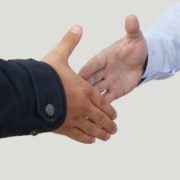Let the NCBA Help You Find Your Path to Wellness
In August, the NCBA is bringing you a free, month-long e-course on mindfulness. Register here.
Once, there was a woman walking down a path who saw a baby drowning in the water. She rushed in to save the baby. As she returned to the bank with the baby in her arms she saw another child thrashing in the current. She braved the river again to save the second child. Before she could return, she saw another baby in the water. A man who was walking down the path offered to help. Soon more good Samaritans joined in to pull child after child from the water. Each passing person offered to help. Everyone helped except one woman who dared ask, “Shouldn’t someone investigate why there are babies in the river?” **
This parable reflects our lives in so many ways. We tackle problem after problem, and never stop to investigate the larger context. It’s the same with our mental health. We patch up and move on, never stopping to investigate how or why we are anxious, moody, unfocused or fatigued.
Even the most successful among us experience self-doubt and worry. The leader of the NCBA’s upcoming mindfulness program experienced this, too. Jeena Cho ran a successful law practice. Despite all the worldly markers of professional achievement, she was unhappy. So she started meditating. Jeena explains, “Once I found stillness, I had the space to examine my life.” Socrates said that the unexamined life is not worth living, and she agrees. Through reflection and stillness, she was able to find a path that made her truly happy, and explore opportunities she would have otherwise missed. (Wright, J. Kim. “Lawyers as Changemakers: The Global Integrative Law Movement”. Chicago: The American Bar Association, 2016. 49-50.)
With a little instruction, you can engage in meaningful self-reflection, and move toward a life of conscious decision making, fulfillment.
Mindfulness is not a fad to fight stress. It’s an ancient practice with proven results for restoring mental balance. It’s not a replacement for medical attention or a treatment for addiction, but it is a step on a healthier path.
Join us, beginning Aug. 2, for a month-long e-course on mindfulness and meditation. We’ll have two webinars and a weekly email check-in to keep you on track. Register for the program here.
As you consider your ability to handle stress, you should examine your approach. Are you taking each crisis one at a time, or are you able to explore the roots of your anxiety? It’s important to catch those babies in the river. But it’s equally important to find out why you’re having to save them in the first place.
If you have any questions, you can email Joyce Brafford at the NCBA’s Center For Practice Management.
**Borrowed, with edits, from J. Kim Wright in “Lawyers as Changemakers: The Global Integrative Movement,” who adapted it from David Lamotte in “Worldchangers 101: Challenging the Myth of the Powerless.”


